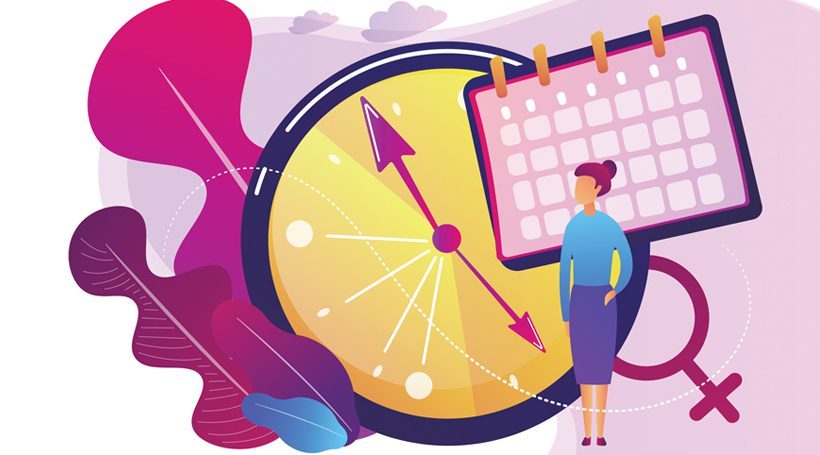Not so long ago, when middle-aged women started feeling hot flashes, brain fog or other changes associated with menopause, the go-to treatment was hormone replacement therapy (HRT). By the 1990s, that was among the most commonly prescribed medications in the United States.

Anthony Salerno, MD
But 20 years ago, research linking HRT to increased health risks caused an avalanche of bad press. Suddenly women who had been successfully using HRT for years quit cold. New prescription rates plummeted. A widespread panic was set off by sensationalized reports about the Women’s Health Initiative (WHI), the largest health study of postmenopausal women, says Anthony Salerno, MD, an OB-GYN with Rowan Medicine. It was widely reported that participants who received HRT in clinical trials had an increased risk of breast cancer.
By the time word got out that the WHI results had been greatly exaggerated, the damage was already done. “It was as if, all of a sudden, estrogen was considered bad in the early 2000s and people ran away from it,” says Salerno. “As a result, a lot of women suffered.”
Although there is extensive research and agreement among all major women’s reproductive health associations that the benefits of HRT outweigh the risks, the reputation of HRT has never fully recovered. As a result, there’s still a lot of misconceptions about the risks and rewards associated with treatments for menopause symptoms.
It’s a matter of estrogen
Women can reach menopause from their late 30s up to age 60. The years leading up to that moment can be rocky, in large part due to the decline in the production of estrogen, the main hormone responsible for promoting reproductive organ health and keeping vaginal tissue healthy, moisturized and supplied with blood.
“Every woman will go through menopause, that’s inevitable,” says Salerno. “But there is a huge variation in the severity of the symptoms people feel.” For those whose hormone levels decrease gradually over time, symptoms tend to be less dramatic. “Those with a rapid decline in their hormone levels are most symptomatic. It can be like hitting a wall.”
While hot flashes and night sweats are most common, other symptoms include vaginal dryness, breast tenderness, chills, painful intercourse, mood changes, thinning hair, brain fog and difficulty sleeping, among others.

Amy Harvey O’Keeffe, MD
HRT eases symptoms by restoring levels of hormones, estrogen in particular. Widely available in different forms, including gels, creams, injections, vaginal rings and pills, they are recommended for healthy women as soon as they’re feeling discomfort, says Amy Harvey O’Keeffe, MD, an OB/GYN with Capital Health Medical Group.
“We have excellent hormone therapy options that are very much like what our bodies make,” says O’Keeffe. “And what we now know is that, for the right population, they’re very safe.”
The intended population includes women who are younger than 60 or within 10 years of the onset of menopause and do not present cardiovascular risk factors such as high blood pressure, diabetes or obesity. There is no one-size-fits-all therapy, O’Keeffe says, noting she and her patients weigh symptoms, concerns and health risks before choosing a course of action.
Women seeking relief of symptoms are the large majority of O’Keeffe’s patients on HRT. She also provides prescriptions for those who, while asymptomatic, use them for other health benefits, including improved bone health. While she doesn’t hesitate to provide HRT to relieve symptoms, she says research is more nuanced about general health effects and worth a conversation.
The research scare
In 2002, the clinical trials on postmenopausal women were called off early in light of findings of safety issues – a small increase of breast cancer, heart disease, stroke and blood clots.
At the time that news hit, Wendy Martinez, MD, OB/GYN and founder of Advocare The Women’s Group for OB/GYN, prescribed HRT to the vast majority of her middle-aged patients.

Wendy Martinez, MD
“Once the news that Women’s Health Initiative trials were called off,” she recalls, “it was like everyone was afraid they were going to have a heart attack or stroke.”
The major problem with the WHI research was that most women in the clinical trials were too old to be safely starting treatments, Martinez says. The average age of the women in the trial was 63 – some were enrolled up to 2 decades after they experienced their last menstrual period.
“They were putting all these high-risk women on hormone replacement that really should not have been,” she says. “That was not at all what my practice was doing.”
Many doctors without specialized knowledge of menopause shied away from HRT for years – not taking into account that there are more treatment options available. Not only did many women suffer through their symptoms for years, they lost the chance to reap other significant health benefits as their bodies were changing, says Martinez.
“Estrogen, which has been the greatest thing for your body for 52 years, doesn’t all of a sudden become harmful to us,” says Martinez, a member of the North American Menopause Society. “There is no question that the best way to prevent bone loss and fractures is with estrogen therapy.”
The Rise of Alternative Treatments
The WHI flap also led to greater use of bioidentical hormone therapy (BHT). Marketed as a natural alternative to HRT and popularized by celebrities who touted the benefits, BHT are hormone therapies custom-mixed in pharmacies based on a healthcare provider’s prescription. They are often given as pellets, the size of a dime, implanted just beneath the skin.
BHTs are not approved by the Federal Drug Administration and not recommended by any major female reproductive health advocacy groups, points out Salerno, who does not offer them in his practice.
“The pellets have never been proven to be beneficial per se, but some women swear by it,” says Salerno. “Women who take them feel better because they’re getting hormones, just in a different form. The big selling point was that they were bioidentical, meaning they were the same chemical formula as what your body would naturally produce. But guess what? There are bioidentical commercially available products now also, so they really lost their selling point.”
There are also alternatives to hormone therapies considered safe for menopausal symptoms, including low-dose antidepressants for hot flashes. Any medications used for menopausal symptoms, he adds, can be viewed as a lifestyle choice, not without risk, he adds.
“When estrogen was all of a sudden considered bad, women suffered,” Salerno says. “And people nowadays are less likely to accept that life is going to be miserable – not when there are treatments available that are relatively safe.”














